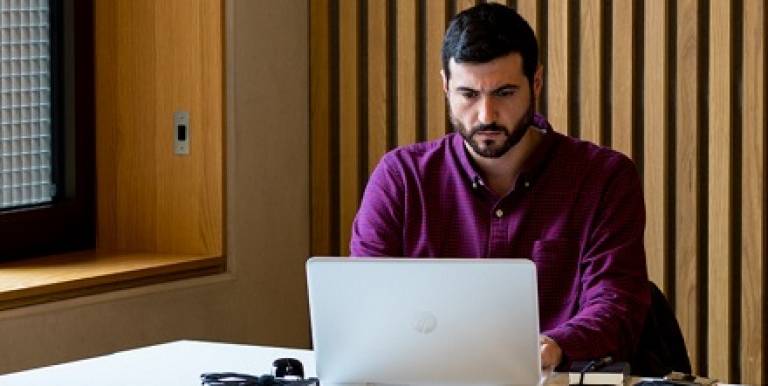AssessmentUCL: our experience so far
25 November 2021
A report on staff and student experiences of the new online platform first used for centrally managed exams in 2020-21.

The shift to remote teaching and assessment in March 2020 accelerated UCL’s vision of providing an inclusive, purpose-built digital assessment platform for staff and students. AssessmentUCL – built on the Wiseflow platform – was procured and tested at the start of this year and successfully delivered more than 1000 centrally managed exams and 50 pilots for over 51,000 candidates in 2021.
To understand what has gone well and any areas for improvement, the Digital Assessment Team, supported by a small team of student ChangeMakers, have completed staff and student surveys, alongside a series of interviews and focus groups.
153 of the 1100 staff users (14% response rate) and 2,047 of the 16,000 student user (13% response rate) responded to their respective surveys. Three Connected Learning student interns worked with the team to analyse the data and produce the final report and slides.
Feedback shows mixed feelings
The findings from the staff and student staff surveys reveal a set of positive and negative experiences.
42% of staff respondents chose to mark externally of the system, either via another application or offline. Of those that marked on the platform, 64% of the respondent’s comments on their experience of marking using AssessmentUCL compared to other systems were negative.
63% of students’ considered their overall experience with AssessmentUCL as positive. Most of the negative comments were very specific regarding a particular issue they faced in the platform; their positive comments were less specific and focused more on the overall experience.
The context in which exams were being taken and marked should also be considered alongside the feedback: remote working may have added to the usual stresses and strains of the exam period and staff and students were asked to adopt the new technology within a short timescale.
Staff responses
Staff found the platform was generally robust and delivered a largely consistent experience.
Their specific comments focused on the improvements they would like to see, which fall into two categories:
- changes to platform settings to enable staff to more easily meet policy or regulations requirements; or
- functional enhancements to the platform.
The highest priorities emerging for staff are:
- Allow multiple scripts to be opened at the same time.
- Allow different assessors to mark separate questions that can then be automatically totalled.
- Enable ‘Quick comments’ – saved comments that can be quickly added to a script to save marking time.
- Allow shared marks and comments with co-assessors or reviewers for every paper, rather than manually setting this for each comment, on each paper, for each student.
- If the assessor has chosen to mark offline, allow annotated pdfs to be uploaded back into the system for reviewers/students to see the comments on the scripts.
Students’ responses
Students’ responses were generally positive but the specific issues they recommended be addressed in future include:
Greater clarity about the various timings of exams (including the upload window).
Different types of practice exams so that students can take the one that reflects the exact exam they are going to take.
Fewer emails about AssessmentUCL and one webpage containing all the relevant information.
Allow multiple file formats (not just PDF) and more than one submission within the exam timeframe.
An emergency submission pathway for students facing technical issues to avoid them having to sit a Late Summer Assessment when they have completed the exam.
Next steps
The 2021-22 evaluation report helped shape this year’s Assessment Operating Model, the work of the new digital assessment advisory team and departmental communications with faculty and students.
UCL have recently formed a partnership agreement with the supplier, Uniwise, to influence their roadmap. Many other universities are also adopting digital assessment platforms and suppliers such as Uniwise are balancing the needs of many institutions. The survey feedback provides compelling evidence for these discussions about platform enhancements but some may be longer-term improvements.
There is no one assessment platform that delivers all the requirements of a multi-disciplinary institution such as UCL, so the team are also investigating potential procurement of additional assessment platforms to meet the full range of our needs.
Further information
We advise you speak to a Digital Assessment Advisor if you would like to discuss your online assessment ideas or get advice for adopting AssessmentUCL.
For any general issues or concerns about the AssessmentUCL Project, you can contact the AssessmentUCL Academic Steering Group.
See also:
Download 2020-21 AssessmentUCL evaluation report [Word]
 Close
Close

